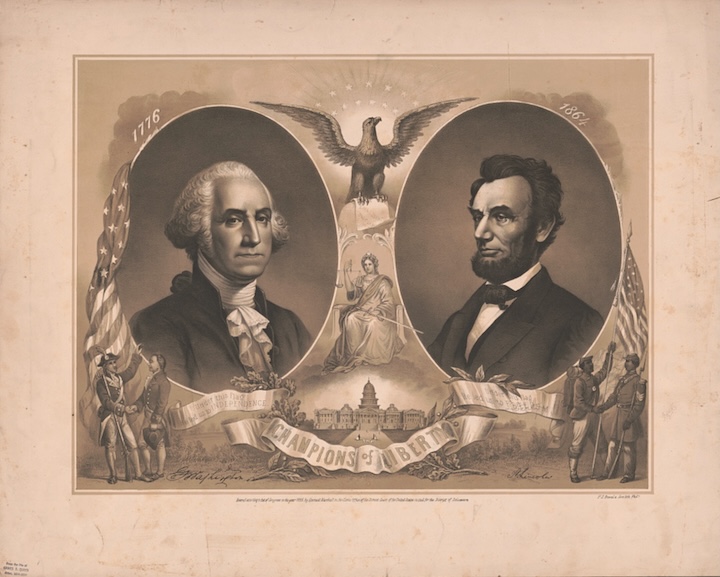In the second-to-last speech in his ill-named drama “Julius Caesar” (it should have been titled “Marcus Brutus”), Shakespeare has Mark Antony pay the now-dead Brutus this supreme and well-known compliment: “This was the noblest Roman of them all.”
Apart from the incidental fact that he was an American and not a Roman, this compliment should have been reserved for George Washington. He, more than any actual Roman, conformed to the Roman ideal of the good man. He was rich, he was proud to be a farmer, he was a brave and successful general, he was a wise statesman, and he was – above all – a great patriot, loving his country more than life itself. He was the man Romans dreamed of. Fortunately for us Americans, God postponed his appearance in the world till the 18th century.
There was a time when Americans thought of Washington as heaven-sent. They, the Americans, were God’s new “chosen people,” and Washington, a new Moses, was sent to lead them. In God’s Providence, the United States was destined to play an important role, and how could we play that role unless God saw to it that we were provided with an extraordinary leader to make sure we had a good beginning?
If you had done a Gallup Poll of Americans in the early 19th century and asked them who was the greatest man ever to live, they would have answered, “Jesus Christ.” And if you had asked who was the second-greatest, they would have answered, “George Washington.”
Of course, nowadays, living as we do in more secular times (i.e., times that are far less Christian), we (by “we” I mean the more “progressive” among us) either no longer believe in God or no longer believe that God (if He happens to exist) bothers to intervene in human history. And we no longer believe that Washington was a moral giant, knowing as we do that he committed the unforgivable sin of slave-owning, which is a compounding of the prior (also unforgivable) sin of racism.
This, in theory, makes Washington morally inferior to the typical American leftist, who takes pride in being not just a non-racist but (what’s far better) an anti-racist. For most of us today, history does not speak the language of God’s Providence. No, the course of history is just one damned thing after another.

If God exists, however, and if He intervenes in human history (it’s hard to imagine why He wouldn’t), it is quite possible that Americans were “chosen” by God and quite likely that Washington was “sent” to us. After all, Washington was one of the best human beings ever to live (the Romans would agree with me on that). And can it be mere chance, not the result of Providence, that this great man happened to be available at the exact moment when Americans most needed him? I for one, being deeply un-progressive, believe he was sent.
February is the month of the birthdays of great American presidents. Washington was born on February 22, 1732 (new style) or February 11, 1731 (old style), and Abraham Lincoln was born on February 12, 1809.
Without question, these two men are the two greatest public men that America has ever produced. It is not easy to say which was the greater. The one, more than anybody else, founded the nation; he was the “indispensable man,” the “father” of his country. The other, more than anybody else, saved the nation, put it back together when it had fallen apart; a second indispensable man.
Washington was a Great Man for a longer time than Lincoln and in a greater number of ways. He first became a Great Man when appointed commander of the Continental Army in 1775, and he remained a Great Man till his death in 1799. He exhibited his greatness again and again: by winning the war, by resigning his commission at war’s end (thus choosing not to become another Cromwell), by presiding at the Constitutional Convention of 1787, by serving as first president of the United States, and by giving up the power of the presidency in March of 1797.
Lincoln had a shorter run on the Great-Man stage. He first mounted it in his debates with Senator Stephen Douglas in 1858. He left it when he was shot on April 14, 1865 (and died the next morning). He saved the Union, he freed the slaves, and he wrote the finest short prose pieces any American has ever written: the Gettysburg Address and the Second Inaugural. But don’t stop reading him there. There’s much more.
It can be argued that Washington was the greater man in terms of accomplishments, but Lincoln was – and still is – the man easier to love. It is easy to admire great Romans, not easy to love them. They are too stoical for our somewhat sentimental/romantic American tastes.
Lincoln is easy to love because he reminds us of Jesus. Honest Abe wasn’t born in a stable, but he was born in a log cabin, which is second best. Like Jesus, he was a “man of sorrows.” And he suffered and died for our sins – that is, for our great national sin of slavery. While it is true that he didn’t rise from the dead, ever since his death he has lived in the hearts and minds of his countrymen, aided and abetted in this immortality by countless historians who have produced, and are still producing, an apparently endless stream of books and articles about him.
And Lincoln was fortunate in his first name, Abraham, the name of the founder of our religion (Jesus being the re-founder of it). It was easy for Americans to think of him as “Father Abraham.”
God has blessed America. It is a tremendous act of ingratitude on our part to forget, as we seem to be doing, our long series of blessings. Our many national problems today may well be products of that ingratitude. God is not mocked.















